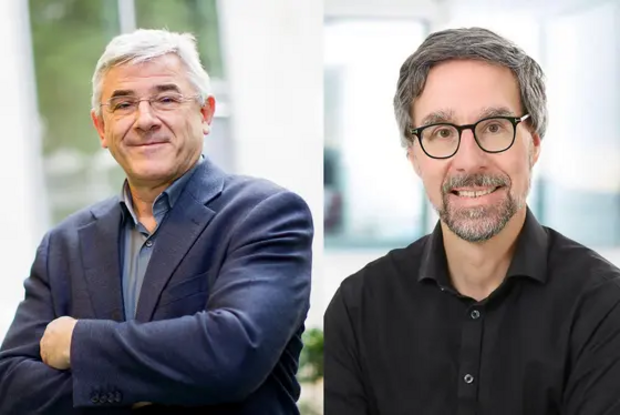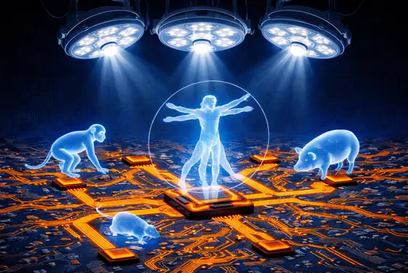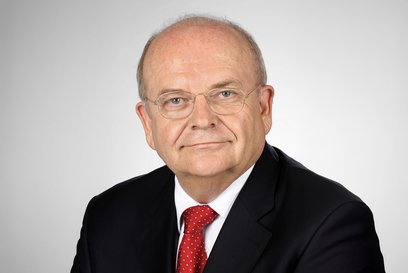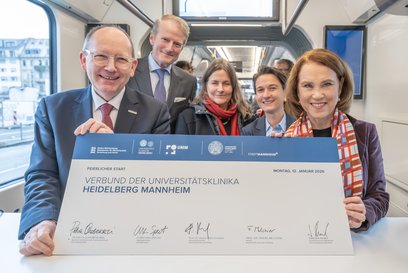News

Double ERC success for DKFZ researchers
01/27/2026
With its Proof of Concept (PoC) grants, the European Research Council (ERC) supports scientists in further developing the economic potential of their research results. Two scientists from the German Cancer Research Center (DKFZ) have now been selected for this prestigious funding: Hellmut Augustin is developing novel mouse tumor models that will ensure better transferability of results while reducing the number of animals used in experiments. Michael Platten plans to further develop an AI-driven classifier to accelerate the complex production of therapeutic T cells for immunotherapy.

AI learns from animals: New approach to improve surgical imaging
01/26/2026 | by Koh
Scientists at the German Cancer Research Center (DKFZ), Heidelberg University Hospital (UKHD), and Mannheim University Medical Center (UMM) are presenting a method that enables artificial intelligence (AI) to learn how to transfer medical image data from animals to humans. This “xeno-learning” could help make surgical procedures safer and more precise in the future – without relying on human training data.

In Memoriam: Professor Dr. med. Dr. h.c. Klaus van Ackern
01/21/2026
Former Ordinarius and Director of the Department of Anesthesiology and Operative Intensive Care Medicine, and for nearly two decades Dean of the Medical Faculty Mannheim of Heidelberg University, has passed away.
University Medicine Mannheim mourns the loss of Professor Dr. med. Dr. h.c. Klaus van Ackern, who passed away on January 18, 2026, at the age of 84 at the hospital he himself led as clinic director for two decades. In 1989, Professor van Ackern was appointed to the Chair of Anesthesiology at the Medical Faculty Mannheim (then still the Faculty of Clinical Medicine Mannheim) of Heidelberg University and named Director of the Department of Anesthesiology and Operative Intensive Care Medicine at what was then the Municipal Hospital Mannheim. In 2009, at the age of 67, he officially retired. This step, however, applied only to his role as clinic director and Ordinarius. At the same time, Professor van Ackern turned his long-standing personal commitment—the leadership of the Medical Faculty as Dean—into his primary professional responsibility.

Merger of the Heidelberg and Mannheim University Hospitals Launched
01/12/2026
The Baden-Württemberg Ministry of Science, Research and the Arts (MWK), Heidelberg University, Heidelberg University Hospital, the City of Mannheim and University Hospital Mannheim officially marked the launch of the merger between the two university hospitals. Representatives of the participating institutions symbolically signed the agreements sealing the merger during a joint special train journey from Mannheim to Heidelberg. The event concluded with a ceremony in the lecture hall of the Kopfklinik on the Heidelberg Medical Campus attended by around 400 invited guests from politics, the healthcare sector, and supporters and staff of both university hospitals.
11/09/2025
» Ângela Gonçalves' talk at the Falling Walls Summit in Berlin
Ângela Gonçalves’ talk at the Falling Walls Summit in Berlin
Prof. Dr. Ângela Gonçalves (Breakthrough of the Year Award 2025) gave a talk at the Falling Walls Summit in November 2025.
News Archiv
12/18/2025
» FLAURARE Study Launches
12/04/2025
» New Public Health Index: Germany Ranks Second-to-Last in Implementing Evidence-Based Prevention Measures
11/28/2025
» Lautenschläger Prize for Young Scientists 2025 awarded to Lukas Bunse
11/20/2025
» Research Award for Jens Puschhof: How Bacteria Can Trigger Cancer
11/14/2025
» Three “Highly Cited Researchers” at the Medical Faculty Mannheim
11/13/2025
» Ten DKFZ Researchers Among the World’s Top 1% Most-Cited in 2025
11/07/2025
» How the Biological Clock Ticks in the Female Reproductive Tract – Breakthrough of the Year Award 2025 for Ângela Gonçalves
10/27/2025
» Role of intestinal bacteria in the development of colorectal cancer: Emmy Noether grant for DKFZ researcher Jens Puschhof
10/14/2025
» Prestigious DFG funding for DKFZ projects
09/26/2025
» Mannheim to lead new DFG research unit
08/14/2025
» Freezing brain tumor cells in a dormant state
07/15/2025
» ERC funding for research into improved cancer immunotherapies
05/27/2025
» Third German Award for Research in Cancer Prevention honors outstanding scientists
05/26/2025
» Explainable artificial intelligence increases the accuracy and endurance of dermatologists in melanoma diagnosis
03/17/2025
» New approach for T-cell immunotherapy against malignant brain tumors
02/27/2025
» DKFZ Hector Cancer Institute at University Medicine Mannheim receives further substantial funding from the Hector Foundation
02/11/2025
» New perspectives for personalized therapy of brain tumors
10/17/2024
» Takeda Oncology Research Award 2024: DKFZ scientists recognized for outstanding research
08/11/2024
» New vaccines offer hope for brain tumor patients
06/28/2024
» German Cancer Research Center kicks off important expansion project
06/14/2024
» DKFZ Hector Cancer Institute rated outstanding in international evaluation
05/28/2024
» With mirrored RNA against highly aggressive brain tumors
05/08/2024
» Circulating tumor cells provide detailed insights into cancer heterogeneity
05/03/2024
» Newly discovered mechanism of T cell control can interfere with cancer immunotherapies
04/15/2024
» Paul Martini Award for therapeutic vaccines against brain tumors
04/11/2024
» ERC Advanced Grants for Hannah Monyer and Michael Platten
03/14/2024
» Machine learning classifier accelerates the development of cellular immunotherapies
09/27/2023
» Transgenic T cells agains malignant brain tumors
09/22/2023
» Life Sciences Bridge Award für Lukas Bunse
09/21/2023
» Mutation-specific peptide vaccine against midline gliomas used in patients for the first time
01/24/2023
» What keeps the immune defense in brain tumors functional
12/20/2022
» Enzyme inhibition promotes bone formation and curbs the development of bone metastases (dkfz.de)
10/24/2022
» How tumors suppress the development of metastases (dkfz.de)
01/20/2022
» DKFZ-Hector Cancer Institute at the University Medical Centre Mannheim (dkfz.de)
03/17/2022
» Wer profitiert von einer zielgerichteten Therapie beim nicht-kleinzelligen Lungenkarzinom? (dkfz.de)
06/13/2022
» Vom Bild zum Gen: Was Minitumoren über zukünftige Therapiemöglichkeiten bei Darmkrebs verraten (dkfz.de)
02/01/2021
» Resistenz gegenüber Krebsimmuntherapien überwinden (dkfz.de)
07/31/2019
» Founding ceremony of the DKFZ-Hector Cancer Institute at the University Medical Center Mannheim (dkfz.de)